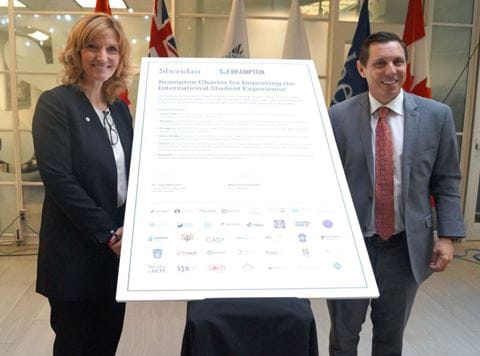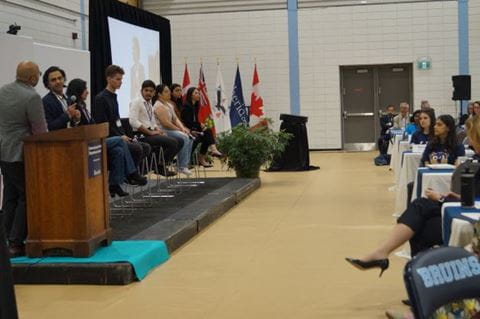The Charter
Overview
The Brampton Charter for Improving the International Student Experience presents a concrete action plan that will make a positive difference in the lives of international students who choose to study and stay in Brampton. The Charter includes shared principles, recommended actions and mechanisms for accountability.
The Charter builds on what we learned from research on accountability measures and their impact, other postsecondary charters, legislative instruments, and the many compelling ideas that emerged from the International Student Summit held in July 2022.
We hope that our work will inspire other jurisdictions to adopt similar community charters of their own, creating a national network of organizations that choose to hold themselves and one another accountable to provide a seamless and successful international student experience.
Above: Dr. Janet Morrison, Sheridan’s President and Vice Chancellor discusses the Brampton Charter for Improving the International Student Experience during an interview on YourTV Halton’s Diverse Perspectives.
Guiding Principles
- Appreciate that international student experiences are complex, multifaceted, distinctive, and as heterogeneous as the students themselves.
- Respect that international students contribute diverse perspectives that enrich the learning experience for all students and are not competing with domestic students for postsecondary spaces.
- Recognize the distinct stressors, atypical obstacles and macro- and micro-level factors that influence the lives of international students.
- Acknowledge the need to view the international student experience holistically beginning from when a student considers studying in Canada to beyond graduation.
- Define the international student experience to encompass physical, mental, social, cultural, financial, and academic well-being, which includes immigration, employment, housing, health, racism, food security, language and belonging.
- Respond through multi-stakeholder engagement to fill the gaps and bridge the silos that challenge a smooth and seamless international student experience.
Sponsors

Organizations that have endorsed these Guiding Principles
- Achēv
- Ahmadiyya Muslim Jama’at Canada
- Algoma University
- Brampton Board of Trade
- Brampton Crematorium & Visitation Centre
- Brilliant Minds Group
- Canada India Foundation
- Canadian Institute of Technology, Entrepreneurship and Management (CITEM)
- Canadian Mental Health Association Peel Dufferin
- Catholic Family Services Peel‑Dufferin
- Cestar College
- City of Brampton
- Dixie Bloor Neighbourhood Centre (DBNC)
- Dream Legacy Foundation
- Dufferin‑Peel Catholic District School Board
- Family Services of Peel
- Humans For Harmony
- Humber College
- Indus Community Services
- International Sikh Students Association
- Knights Table
- Laadliyan
- Lambton College
- Network of Nigerians in Canada
- Ontario Gurdwaras Committee
- Our Place Peel
- Peel Children’s Aid Society (Peel CAS)
- Peel District School Board
- Peel Newcomer Strategy Group
- Peel Region
- Peel Regional Police
- Punjabi Community Health Services (PCHS)
- Queen’s College
- Regional Municipality of Peel – Police Services Board
- Roots Community Services
- Rotary Club of Brampton
- Sai Dham Food Bank
- Sault College
- Seva Food Bank
- Sheridan at CCTT
- Sheridan Student Union (SSU)
- Soch Mental Health
- Sukhmani Haven
- triOS College
- William Osler Health System
- World Sikh Organization of Canada
If your organization would like to endorse these Guiding Principles, please contact:
Harinder Malhi
Director of Government and Community Relations
harinder.malhi1@sheridancollege.ca
Goals & Actions
-
GOAL 1: Upholding ethical recruitment standards and practices
Recognizing that financial stability is at the heart of the safety and well-being of the international student experience, postsecondary institutions and Charter signatories commit to the following:
- Inform international applicants early and comprehensively about all related expenses, not just tuition and fees.
- Encourage and streamline direct application processes. Where agents are involved, ensure processes are in place to only partner with trustworthy and vetted enrolment agents.
- Create a public database of unethical agents.
- Provide consistency in tuition and fee policy and protection against substantial increases in international student tuition and fees.
- Commit to shared data collection on the international student population, including mapping of changing demographics, enrolment patterns, and international student needs.
-
GOAL 2: Creating academic and wrap-around supports for learners
Recognizing that academic standards and pedagogical relationships vary considerably across cultures, and that international students need accessible guidance on how to navigate the Canadian academic and social environment, postsecondary institutions and Charter signatories commit to the following:
- Create a hub where students can access accurate, trusted information throughout their journey.
- Call on all levels of government to adequately fund community-based non-profits that offer mental health and other supports.
- Partner with/advocate to other levels of government/the province for collaboration and funding.
- Undertake periodic assessments of available health insurance plans and coverage for international students.
- Provide culturally appropriate and multilingual health care and supports.
- Create trauma-informed best practices for the more severe cases of international students needing urgent help (suicides or attempted suicides, unexpected pregnancies, homelessness, justice system).
- Facilitate the integration of domestic and international students, promote connections to alumni and create positive engagement opportunities between international students and the community, supported by cross-cultural training.
- Work to positively shape the messaging and narratives on the international student experience.
-
GOAL 3: Promoting safe and affordable housing and financial stability
Recognizing that postsecondary institutions and all levels of government should work with local partners, the development industry and government to ensure access to safe, affordable and accessible housing both on and off campus, Charter signatories commit to the following:
- Consider housing and transportation opportunities for international students as part of municipal planning.
- Support the delivery of affordable student housing through streamlined approvals.
- Advocate for and promote safe and legal rental accommodation that is subject to inspection and reporting.
- Educate property owners on registration of rental units with the municipality to help meet safety standards.
- Educate international students on rights and responsibilities under the Landlord and Tenant Act and facilitating access to affordable legal counsel.
- Recognize food insecurity as a growing issue among international students and provide targeted support and resources so that learners can afford both rent and groceries.
- Allocate a percentage of international student tuition and fees revenue to financial scholarships and supports for international students.
-
GOAL 4: Providing opportunities for legal and reliable work
Recognizing that many international students work to support their families back home and pay for their tuition/living expenses, Charter signatories commit to the following:
- Develop targeted experiential education and co-op opportunities for international students, keeping in mind their unique challenges when accessing careers and employability support.
- Prevent and reduce exploitation of international students through stronger enforcement of provincial labour laws, especially as they relate to temporary work and the gig economy that many international students rely on during their studies.
- Inform international students of their rights as workers and offer provision to connect with appropriate legal complaint and advocacy support services.
- Educate employers about the benefits of hiring international students and graduates and the immigration regulations that facilitate their employment.
- Engage in advocacy with employers, relevant community organizations and all levels of government to improve employment outcomes for international students and graduates.
-
GOAL 5: Championing well-defined and transparent pathways to citizenship for international students
Recognizing the intergovernmental nature of immigration- and settlement-related issues to improving the international student experience, each level of government should commit to the following:
- Request that the federal government provide timely, accurate and plain-language information on immigration-related matters including student visas and applications, arrival information, entitlements and responsibilities, work regulations during and post study, and application for permanent residency and citizenship.
- Request that the provincial government provide clarity to postsecondary graduates on dates and application procedures through the Ontario Immigrant Nominee Program (ONIP) program.
- Partner with the regional/municipal government to provide increased access to and awareness of recreational, community safety/well-being and public health opportunities to ensure a safe and successful transition to permanent residency.
Accountability Measures
- Invest in regular data collection from signatories to encourage consistency in data governance and data sharing. Develop systematic reporting of international student profiles in Brampton and Peel Region.
- Embed the implementation, monitoring and accountability of this Charter within existing structures.
- Develop a self-reporting system for signatories to share the investment, implementation, and monitoring of progress toward the calls to action annually.
- Introduce recognition measures to celebrate, reinforce and share best-practice models.
- Commit to promoting continued conversations, fostering constructive dialogue, and advancing mutual learning by sharing insights, good practices, and data-driven reporting on the implementation of the Charter by all signatories. Sharing is envisioned through summits, workshops and other efforts to strengthen inter-institutional communities of practice.
- Publish the Charter and associated links on the websites of all signatories.
Add your voice: Provide feedback on the Charter
Now that you’ve had the opportunity to consider the Charter, we would love to hear from you.
Background
The City of Brampton and Sheridan College convened a Roundtable in fall 2021. Using a collective impact approach, this Roundtable brought together a wide range of community leaders interested in developing an integrated strategy to help international students thrive.



